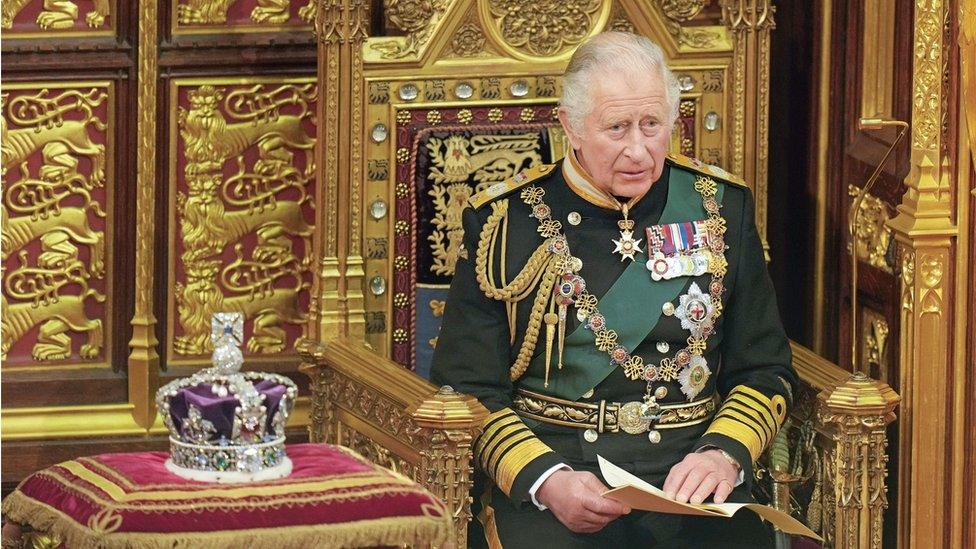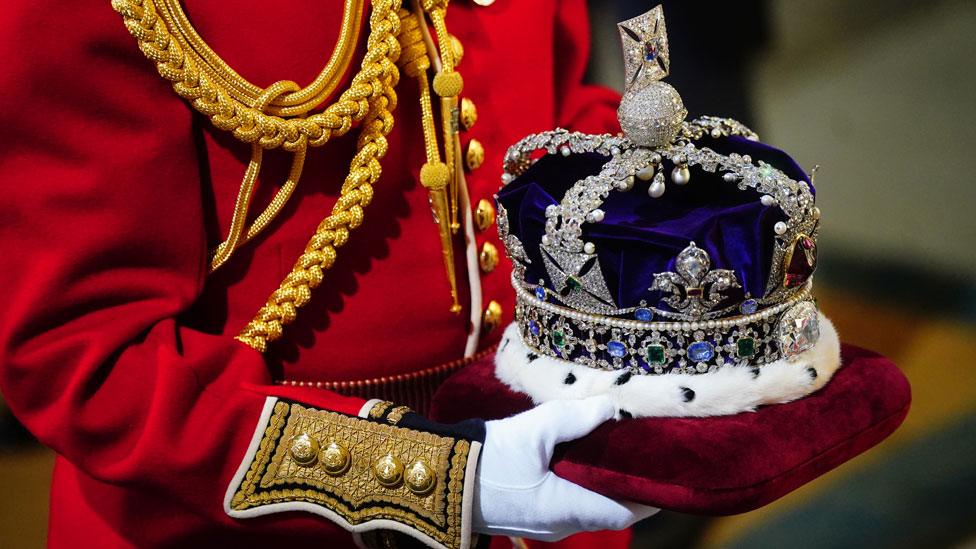Government to toughen sentences for sexual crimes in King's Speech
- Published

King Charles delivered the Queen's Speech on behalf of his mother in May 2022
Offenders who commit murders with sexual or sadistic motives will spend the rest of their lives in prison, under government proposals.
The plan will be in the King's Speech, where King Charles reads out the government's plan for the year ahead at the State Opening of Parliament.
It will also include measures to force criminals to appear in the dock, and a law to prevent prisoners from marrying.
This will be King Charles's first time delivering the speech as monarch.
It will also be Rishi Sunak's first King's Speech as prime minister - and could be the last before the next general election, which is expected next year.
It presents the Conservatives, which have lagged Labour in the opinion polls for more than a year, with an opportunity to showcase key policies and create pre-election political dividing lines.
Around a third of the 20 or so bills have been carried over from last year's parliamentary session or previously published in some form.
The event will be televised on BBC One and BBC iPlayer from 10:30 GMT with live radio coverage on BBC Radio 5 Live.
King Charles previously delivered the Queen's Speech on behalf of his mother at the last State Opening of Parliament in May 2022.
In comments released before the speech, Mr Sunak said: "I want everyone across the country to have the pride and peace of mind that comes with knowing your community, where you are raising your family and taking your children to school, is safe."
Labour's shadow justice secretary Shabana Mahmood said the Conservatives were "using the most significant event in the parliamentary calendar to simply repackage ideas they've announced multiple times".
"There's no use posturing on law and order when the criminal justice system is crumbling under the government's feet after 13 years of mismanagement."

What is the King's Speech?
The King's Speech provides the government with an opportunity to outline its priorities for the months ahead.
It is a key part of the State Opening of Parliament ceremony, which marks the start of the parliamentary year.
Traditionally, it begins with a procession in which the King travels from Buckingham Palace to Westminster by carriage, before he delivers the speech.
The speech itself is written by the government, with the monarch delivering it in a neutral tone to avoid any appearance of political support.
About two hours after the speech is delivered, MPs reassemble in the House of Commons to begin debating its contents.
At the end of the debate, which normally lasts about five days, there is a vote. It is normally seen as symbolic as it is extremely rare for a government to lose it.

In addition to the crime bills:
The speech is expected to include a bill to change the leasehold system, which has led to some homeowners facing heavy maintenance bills and legal fees
There will be a bill allowing licences for oil and gas projects in the North Sea to be awarded annually
The speech is likely to include legislation to implement polices already announced by the government, including a plan to gradually ban smoking by raising the legal age to buy cigarettes in England and establish a regulator for English football
However, a proposal from Home Secretary Suella Braverman to restrict the use of tents by homeless people will not feature in the speech and will undergo further scrutiny, according to BBC Newsnight's Nick Watt.
Ahead of the speech, the government confirmed that two crime bills for England and Wales would be announced - the Sentencing Bill and Criminal Justice Bill - while the Victims and Prisoners Bill would continue its progress in the Commons.
The Sentencing Bill would implement past promises from ministers that those convicted of murders involving a sexual or sadistic element would be given a whole-life order - meaning an offender has no prospect for release, unless there are exceptional compassionate grounds for their release.
According to the Ministry of Justice, external, there are currently 67 whole-life prisoners.
The Criminal Justice Bill would introduce tougher sentences for grooming gang members and those who murder their partner at the end of a relationship.
The government says the bill would also "make clear in law that reasonable force can be used to make criminals appear in the dock".
Offenders who still refuse would be given two extra years in prison.
Ministers announced plans for such a law earlier this year, following high-profile cases of offenders refusing to appear for their sentencing such as the baby killer Lucy Letby and Jordan McSweeney - who was convicted of murdering Zara Aleena.
Ms Aleena's family have previously said the new law would give "a strong message to offenders", but persuasion was better than force.
McSweeney's minimum tariff of 38 years was reduced to 33 years following a Court of Appeal ruling last week.

Zara Aleena was murdered by Jordan McSweeney in east London on 26 June
Some defence lawyers have questioned how easy it would be to enforce in practice.
Judges already have the power to order a defendant to appear in court and refusing the order can result in prosecution under the Contempt of Court Act, however there is believed to be only one example of this happening in the past decade.
The new law would specify that custody officers would be allowed to use reasonable force to compel a defendant to appear at a sentence. Officers could tell a judge if it is not safe to restrain violent criminals.
The Criminal Justice Bill will also give police the power to enter a building without a warrant to seize stolen goods if they have reasonable proof that the item is inside the property - for example by a stolen mobile phone which is broadcasting its position.
The King's Speech is expected to see the first major demonstration by anti-monarchy campaign group Republic since a number of its members were arrested on the day of the coronation in May. Twenty-one people were subsequently told they faced no further action.
A few hundred people are expected to gather near Parliament ahead of Tuesday's event.
Just days before the coronation, new legislation came into force creating new offences of "locking on" or going equipped to lock on under the Public Order Act. Locking on involves a person locking or attaching themselves to an object or building in order to cause disruption.
The subsequent arrests of republican protesters, which came despite the demonstration having been discussed with the Metropolitan Police in advance, drew widespread criticism.

Sign up for our morning newsletter and get BBC News in your inbox.

- Published7 November 2023

- Published17 July 2024
